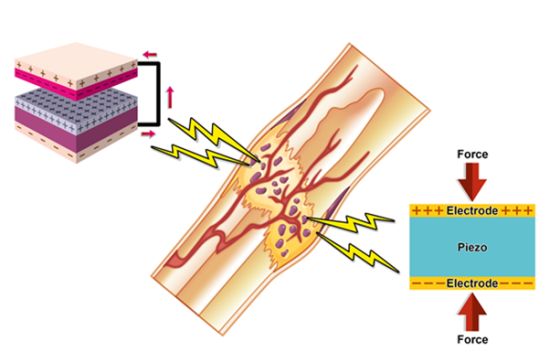|
|
|
|
|
|
| Materials with special electric properties can help promote bone's natural healing processes. |
TSUKUBA, Japan, Feb 13, 2020 - (ACN Newswire) - Some materials show promise promoting bone regeneration by enhancing its natural electrical properties, according to a review in the journal Science and Technology of Advanced Materials.
 | | Triboelectric nanogenerators (left) and piezoelectric materials (right) are being investigated for their potential to improve bone's natural healing properties. (Copyright: NIMS) |
Some solids, including bone, enamel and quartz, form an electric field when deformed. This property, called the piezoelectric effect, happens when a mechanical force pushes atoms closer together or further apart, upsetting the electric balance and causing positive and negative charges to appear on opposite sides of a material.
Scientists discovered that bone was a piezoelectric material in 1957. Since then, they have found that piezoelectricity occurs when bone collagen fibres slide against each other. This leads to the accumulation of charges and the generation of a tiny current, which opens up calcium ion channels in bone cells called osteocytes. This triggers a cascade of signalling pathways that ultimately promote bone formation.
"Piezoelectricity is one of several mechanical responses of the bone matrix that allows bone cells to react to changes in their environment," explain biomedical engineer Zong-Hong Lin of Taiwan's National Tsing Hua University and medical doctor Fu-Cheng Kao of Taiwan's Chang Gung Memorial Hospital, who led the review.
Researchers are seeking to leverage this property to improve bone regeneration and repair. For example, they are exploring materials to fabricate tiny, self-powered electric generators that can be implanted inside or outside bone to stimulate its natural healing processes.
Some teams have significantly accelerated the proliferation and differentiation of mouse embryonic bone-forming cells when using a so-called triboelectric nanogenerator. An electric current is generated when two materials are separated and then brought back into contact. These nanogenerators have been tested with materials such as polydimethylsiloxane, indiumtin oxide, aluminium, and polytetrafluoroethylene. They are showing potential for treating osteoporosis and osteoporosis-related fractures.
Piezoelectric nanogenerators, on the other hand, are made by connecting an electrode to a piezoelectric material on a flexible substrate, and generate a current when force is applied. These nanogenerators have also been shown to promote the proliferation of human bone-forming cells.
Besides nanogenerators, piezoelectric polymers, which have good biocompatibility with human tissues, are showing promise as absorbable screws and pins in severe bone fractures, helping avoid a second surgery for their removal.
Piezoelectric ceramics provide stronger electric currents compared to polymers, but can be toxic. Non-lead-based ceramics, like barium titanate, hydroxyapatite, and zinc oxide are leading candidates for bone scaffolds that promote bone growth and regeneration and for artificial bone substitutes.
Lin and his colleagues expect further research will lead to piezoelectricity-based applications for tissue engineering and bone regeneration.
Further information
Zong-Hong Lin
Taiwan's National Tsing Hua University
linzh@mx.nthu.edu.tw
Paper
https://doi.org/10.1080/14686996.2019.1693880
About Science and Technology of Advanced Materials Journal
Open access journal STAM publishes outstanding research articles across all aspects of materials science, including functional and structural materials, theoretical analyses, and properties of materials.
Shunichi Hishita
STAM Publishing Director
HISHITA.Shunichi@nims.go.jp
Press release distributed by ResearchSEA for Science and Technology of Advanced Materials.
Topic: Press release summary
Source: Science and Technology of Advanced Materials
Sectors: Materials & Nanotech
http://www.acnnewswire.com
From the Asia Corporate News Network
Copyright © 2026 ACN Newswire. All rights reserved. A division of Asia Corporate News Network.
|
|
|

|
|
|
|
| Science and Technology of Advanced Materials |
| July 8, 2025 06:48 HKT/SGT |
|
Progress towards potassium-ion batteries |
| June 23, 2025 00:15 HKT/SGT |
|
New method to blend functions for soft electronics |
| May 5, 2025 03:20 HKT/SGT |
|
New Database of Materials Accelerates Electronics Innovation |
| Jan 28, 2025 08:00 HKT/SGT |
|
High-brilliance radiation quickly finds the best composition for half-metal alloys |
| Dec 3, 2024 23:15 HKT/SGT |
|
Machine learning used to optimise polymer production |
| Oct 25, 2024 23:00 HKT/SGT |
|
Machine learning can predict the mechanical properties of polymers |
| July 30, 2024 20:00 HKT/SGT |
|
Dual-action therapy shows promise against aggressive oral cancer |
| Apr 17, 2024 22:00 HKT/SGT |
|
A new spin on materials analysis |
| Apr 12, 2024 18:00 HKT/SGT |
|
Kirigami hydrogels rise from cellulose film |
| Feb 27, 2024 08:00 HKT/SGT |
|
Sensing structure without touching |
| More news >> |
 |
|
|